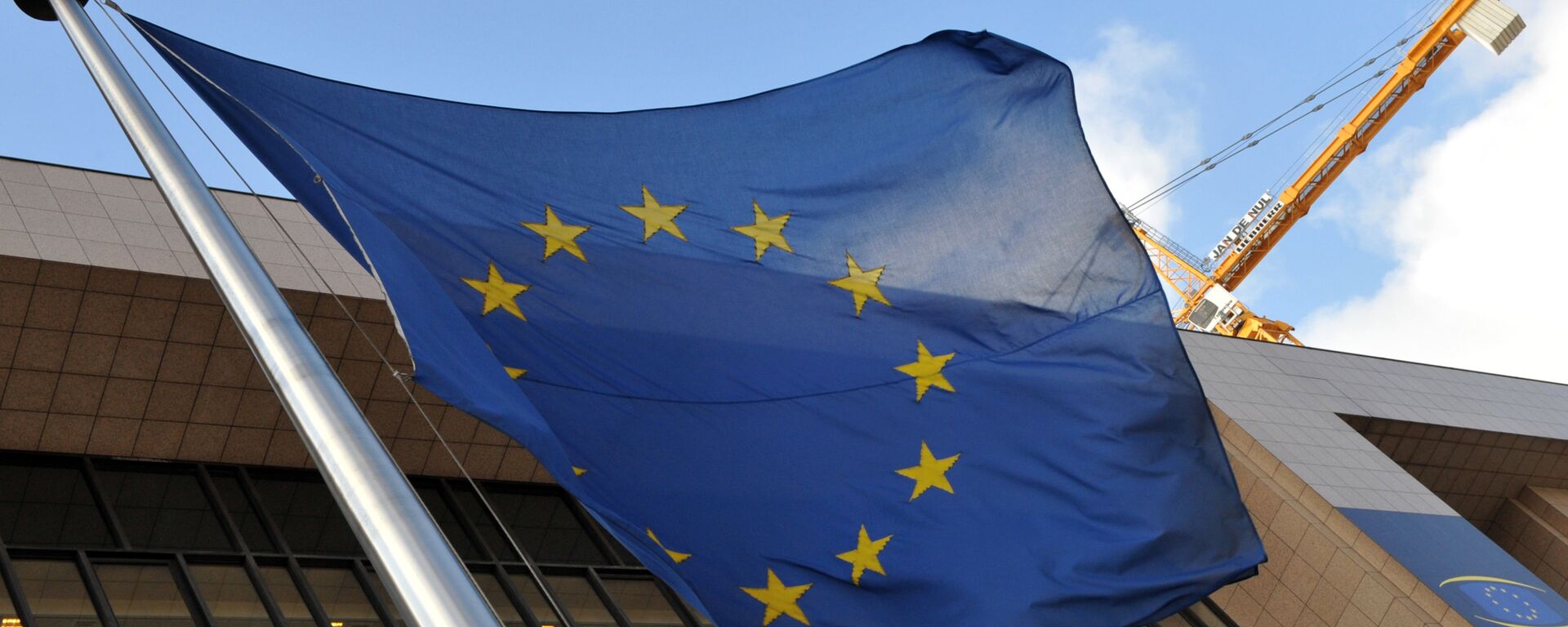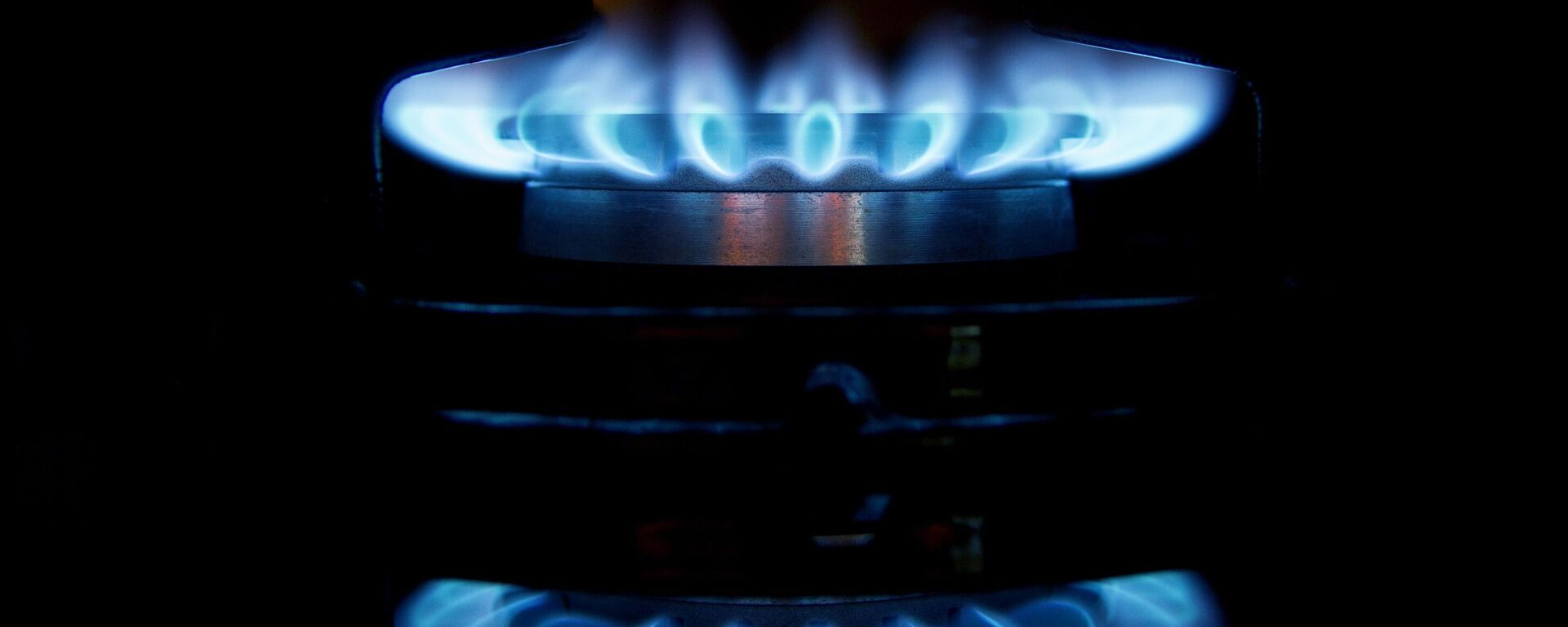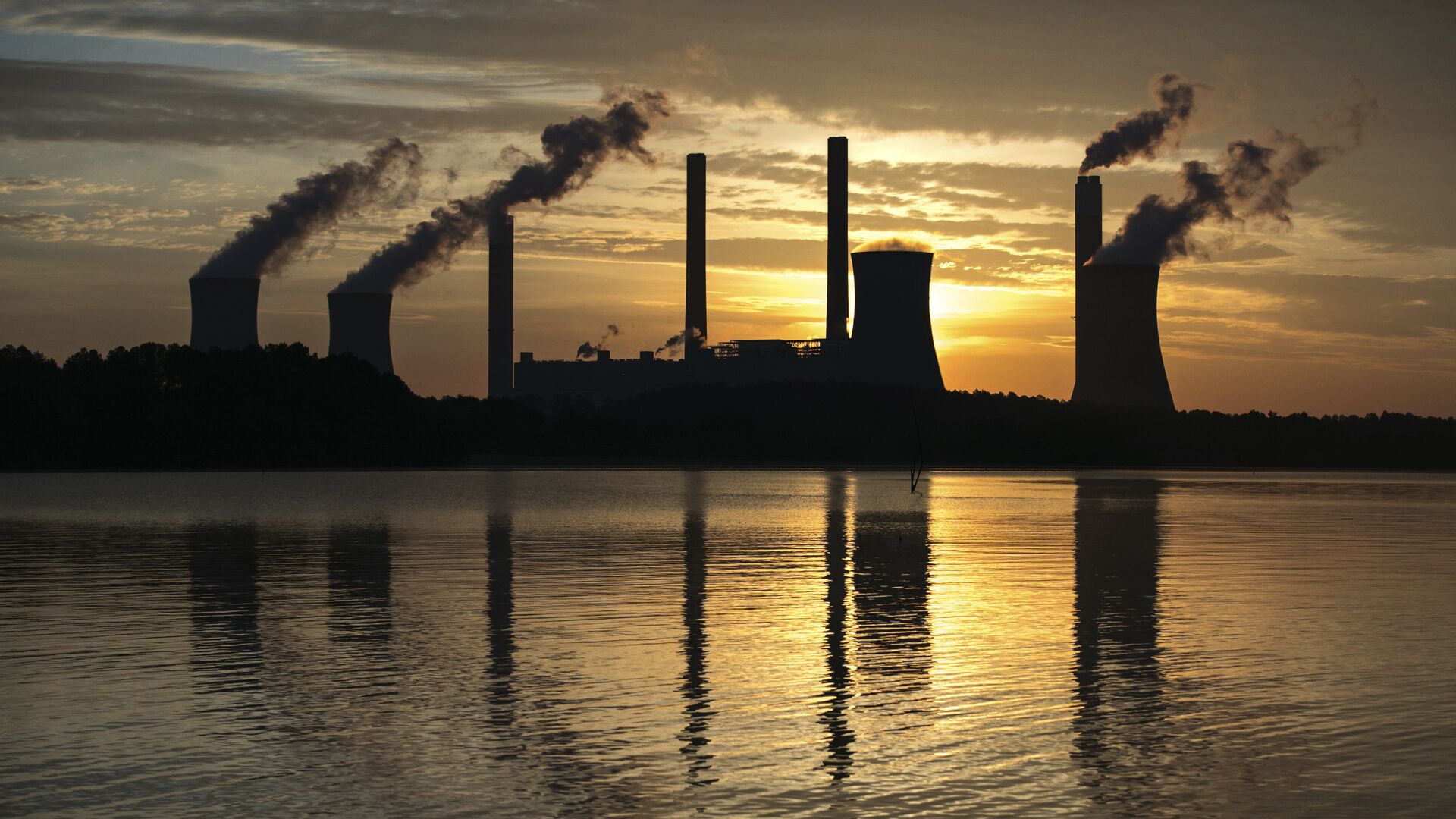https://sputnikglobe.com/20221220/why-eu-carbon-border-tax-will-lead-to-market-destabilization-higher-prices--inflation-1105643738.html
Why EU Carbon Border Tax Will Lead to Market Destabilization, Higher Prices & Inflation
Why EU Carbon Border Tax Will Lead to Market Destabilization, Higher Prices & Inflation
Sputnik International
On December 18, EU governments agreed on the details of the first-ever Carbon Border Adjustment Mechanism (CBAM), which would impose a "pollution" price on... 20.12.2022, Sputnik International
2022-12-20T14:34+0000
2022-12-20T14:34+0000
2023-04-12T17:15+0000
analysis
opinion
europe
climate change
carbon tax
us
joe biden
global market
recession
inflation
https://cdn1.img.sputnikglobe.com/img/105863/06/1058630632_0:0:4832:2719_1920x0_80_0_0_8e772c06c33bbb0b5ea3301c00528b67.jpg
"This carbon tax is just another act of self-mutilation by the EU. First, their policies drove up energy prices, now they need to protect the very same energy-intensive industries the EU has led toward extinction. What’s more noble than doing this under the guise of environmental stewardship?" Dr. Gal Luft, co-director of the US-based Institute for the Analysis of Global Security and a senior adviser to the United States Energy Security Council, told Sputnik.The measure was proposed last week as part of the Old Continent's ambitious goal to cut greenhouse gas emissions by at least 55% by the year 2030, compared to 1990. The idea behind the CBAM is "to equalize the price of carbon paid for EU products operating under the EU Emissions Trading System (ETS) and the one for imported goods."According to the EU's grand design, companies importing goods into the bloc will need to buy "CBAM certificates" in order to fill the gap "between the carbon price paid in the country of production and the price of carbon allowances in the EU ETS."In addition to that, the initiative is aimed at disincentivizing EU companies from moving production to countries more "tolerant" of carbon emissions. Earlier this year, the US press reported that some European industries and firms had started to move to the US as well as to some developing countries due to soaring energy costs in the EU and recession fears.The CBAM will first cover iron and steel, cement, aluminum, fertilizers, electricity production, and hydrogen, and will later be extended to other goods. The measure is set to apply from October 2023.EU Measure Contradicts WTO RulesThe authors of the new carbon tax are insisting that the measure is "designed to be in full compliance with World Trade Organization (WTO) rules," something that some European observers strongly disagree with.The EU carbon tax schemes are clearly incompatible with any idea of free trade and the mindset that contrived them might originate in the West's unipolar moment, according to Alex Krainer, researcher, trader and hedge fund manager, founder of Krainer Analytics, and creator of I-System Trend Following."Such schemes might only make sense to the extent that the whole world adopts and implements them," Krainer told Sputnik. "Otherwise, they would set carbon-heavy economies at an arbitrary disadvantage against carbon-light economies. Carbon-heavy economies - industrial nations like Russia, China, India, Pakistan, the global south, oil and gas and mining producers have little incentive to abide by such schemes."The United States has also signaled dissatisfaction with the European bloc's new carbon border tax. US Trade Representative Katherine Tai told a conference in Washington last week that there are a lot of concerns coming from the US about how this is going to impact its trade relationship with the EU.It is believed that the new measure has come in response to US President Joe Biden's Inflation Reduction Act (IRA), which was inked into law in August 2022. The IRA offers tax credits for electric cars made in North America and prioritizes US battery supply chains. On top of that, the policy envisages investing billions in new US electric vehicle incentives. The EU complained earlier this year that the IRA could create new trade barriers for European electric vehicle (EV) manufacturers and an "unfair" advantage for North American producers.Global Trade Will be Affected NegativelyThe EU's measure is likely to have an adverse effect on global trade, according to Dr. Mamdouh G. Salameh:"By adopting the cross-border carbon tax, the EU is trying to tie trade policy to climate change," the oil expert explained. "But such a measure will adversely affect global trade and target some specific and vital industries whose emissions are an integral part of their manufacturing, such as iron and steel, cement, fertilizers, aluminum, and electricity generation, as well as energy production. This means that energy-exporting countries and those exporting steel, cement and aluminum to name but a few will be affected."According to Salameh, the EU measure amounts to "an import tax in disguise." To illustrate his point, he referred to Turkey and Indonesia. Roughly 40% of their exports go to the EU, which means that they will be forced to introduce carbon taxes at considerable cost to themselves to mitigate the CBAM’s effects on their exports. The CBAM is poised to hit developing countries harder than the US.However, the crux of the matter is that if developing countries decide to sell their products somewhere else in cheap energy environments, "European industries are not expected to be able to fill the gap caused by this departure," according to Luft."The results of this folly will be as devastating as always," the American scholar forecast. "Market destabilization, additional supply chain breakdowns and – as always – higher prices and inflation."Still, Krainer believes that there is more to this controversial policy than meets the eye."These objectives are clearly being pursued in earnest across the Western world, but I think their ultimate objective is not merely protectionist," the analyst suggested. "This would imply they are trying to give themselves a competitive advantage in global trade. But it seems that their objective is to end global trade, to fix people in place in a new feudal type of social arrangement and to end all communications with the other block. This is all consistent with the Great Reset agenda and the various UN sponsored agendas (Agenda 2030, 2050, etc.) I believe this is far more sinister and anti-humanistic than merely rearranging global rules of trade."
https://sputnikglobe.com/20221218/eu-clinches-deal-to-overhaul-blocs-carbon-market-1105562957.html
https://sputnikglobe.com/20221219/eu-energy-ministers-set-cap-on-ttf-gas-market-at-180-euros-per-mwh-1105618053.html
Sputnik International
feedback@sputniknews.com
+74956456601
MIA „Rosiya Segodnya“
2022
News
en_EN
Sputnik International
feedback@sputniknews.com
+74956456601
MIA „Rosiya Segodnya“
Sputnik International
feedback@sputniknews.com
+74956456601
MIA „Rosiya Segodnya“
carbon border adjustment mechanism (cbam), climate change, global market, inflation, recession, eu, us, inflation reduction act (ira)
carbon border adjustment mechanism (cbam), climate change, global market, inflation, recession, eu, us, inflation reduction act (ira)
Why EU Carbon Border Tax Will Lead to Market Destabilization, Higher Prices & Inflation
14:34 GMT 20.12.2022 (Updated: 17:15 GMT 12.04.2023) On December 18, EU governments agreed on the details of the first-ever Carbon Border Adjustment Mechanism (CBAM), which would impose a "pollution" price on certain imports to the bloc. What's behind the measure and how could it affect the global market?
"This carbon tax is just another act of self-mutilation by the EU. First, their policies drove up energy prices, now they need to protect the very same energy-intensive industries the EU has led toward extinction. What’s more noble than doing this under the guise of environmental stewardship?" Dr. Gal Luft, co-director of the US-based Institute for the Analysis of Global Security and a senior adviser to the United States Energy Security Council, told Sputnik.
"Ironically, the EU is doing the exact same thing it criticized the Biden administration for doing as part of its Inflation Reduction Act – protectionism under the guise of environmentalism," Luft continued.
The measure was proposed last week as
part of the Old Continent's ambitious goal to cut greenhouse gas emissions by at least 55% by the year 2030, compared to 1990. The idea behind the CBAM is
"to equalize the price of carbon paid for EU products operating under the EU Emissions Trading System (ETS) and the one for imported goods."According to the EU's grand design, companies importing goods into the bloc will need to buy "CBAM certificates" in order to fill the gap "between the carbon price paid in the country of production and the price of carbon allowances in the EU ETS."
In addition to that, the initiative is aimed at disincentivizing EU companies from moving production to countries more "tolerant" of carbon emissions. Earlier this year, the US press reported that some European industries and firms had started to move to the US as well as to some developing countries due to soaring energy costs in the EU and recession fears.
The CBAM will first cover iron and steel, cement, aluminum, fertilizers, electricity production, and hydrogen, and will later be extended to other goods. The measure is set to apply from October 2023.

18 December 2022, 10:30 GMT
EU Measure Contradicts WTO Rules
The authors of the new carbon tax are insisting that the measure is "designed to be in full compliance with World Trade Organization (WTO) rules," something that some European observers strongly disagree with.
"In my view, the EU tax initiative is neither compatible with the rules of the World Trade Organization (WTO) nor viable, thus forcing exporting countries to shift their exports to other markets," Dr. Mamdouh G. Salameh, an international oil economist and one of the world’s leading experts on oil, told Sputnik. "[E]xporters of energy products and metals will be disadvantaged compared to EU companies or foreign companies who emit less. And yet these exports are the backbone of the global economy. EU countries can’t stop importing them and therefore the EU should either exempt exporters of these commodities or alternatively pay the tax themselves."
The EU carbon tax schemes are clearly incompatible with any idea of free trade and the mindset that contrived them might originate in the West's unipolar moment, according to Alex Krainer, researcher, trader and hedge fund manager, founder of Krainer Analytics, and creator of I-System Trend Following.
"Such schemes might only make sense to the extent that the whole world adopts and implements them," Krainer told Sputnik. "Otherwise, they would set carbon-heavy economies at an arbitrary disadvantage against carbon-light economies. Carbon-heavy economies - industrial nations like Russia, China, India, Pakistan, the global south, oil and gas and mining producers have little incentive to abide by such schemes."
The United States has also signaled dissatisfaction with the European bloc's new carbon border tax. US Trade Representative Katherine Tai told a conference in Washington last week that there are a lot of concerns coming from the US about how this is going to impact its trade relationship with the EU.
It is believed that the new measure has come in response to US President Joe Biden's Inflation Reduction Act (IRA), which was inked into law in August 2022. The IRA
offers tax credits for electric cars made in North America and prioritizes US battery supply chains. On top of that, the policy envisages investing billions in new US electric vehicle incentives. The EU complained earlier this year that the IRA could create new trade barriers for European electric vehicle (EV) manufacturers and an "unfair" advantage for North American producers.

19 December 2022, 17:04 GMT
Global Trade Will be Affected Negatively
The EU's measure is likely to have an adverse effect on global trade, according to Dr. Mamdouh G. Salameh:
"By adopting the cross-border carbon tax, the EU is trying to tie trade policy to climate change," the oil expert explained. "But such a measure will adversely affect global trade and target some specific and vital industries whose emissions are an integral part of their manufacturing, such as iron and steel, cement, fertilizers, aluminum, and electricity generation, as well as energy production. This means that energy-exporting countries and those exporting steel, cement and aluminum to name but a few will be affected."
According to Salameh, the EU measure amounts to "an import tax in disguise." To illustrate his point, he referred to Turkey and Indonesia. Roughly 40% of their exports go to the EU, which means that they will be forced to introduce carbon taxes at considerable cost to themselves to mitigate the CBAM’s effects on their exports. The CBAM is poised to hit developing countries harder than the US.
"[L]ooking at the carbon tax, developing countries would perceive it as a hidden protectionism ploy," the energy expert continued. "It risks hurting developing and poorer countries of the world. It could equally be considered as violating the rules of WTO. It amounts to the EU giving itself a trade advantage at the expense of other countries (…) [r]ather than leaving developing countries to adapt as best they can, the EU should allocate part of the revenue from the proposed CBAM to help foster a just green transition for poorer countries."
However, the crux of the matter is that if developing countries decide to sell their products somewhere else in cheap energy environments, "European industries are not expected to be able to fill the gap caused by this departure," according to Luft.
"The results of this folly will be as devastating as always," the American scholar forecast. "Market destabilization, additional supply chain breakdowns and – as always – higher prices and inflation."
Still, Krainer believes that there is more to this controversial policy than meets the eye.
"These objectives are clearly being pursued in earnest across the Western world, but I think their ultimate objective is not merely protectionist," the analyst suggested. "This would imply they are trying to give themselves a competitive advantage in global trade. But it seems that their objective is to end global trade, to fix people in place in a new feudal type of social arrangement and to end all communications with the other block. This is all consistent with the Great Reset agenda and the various UN sponsored agendas (Agenda 2030, 2050, etc.) I believe this is far more sinister and anti-humanistic than merely rearranging global rules of trade."






